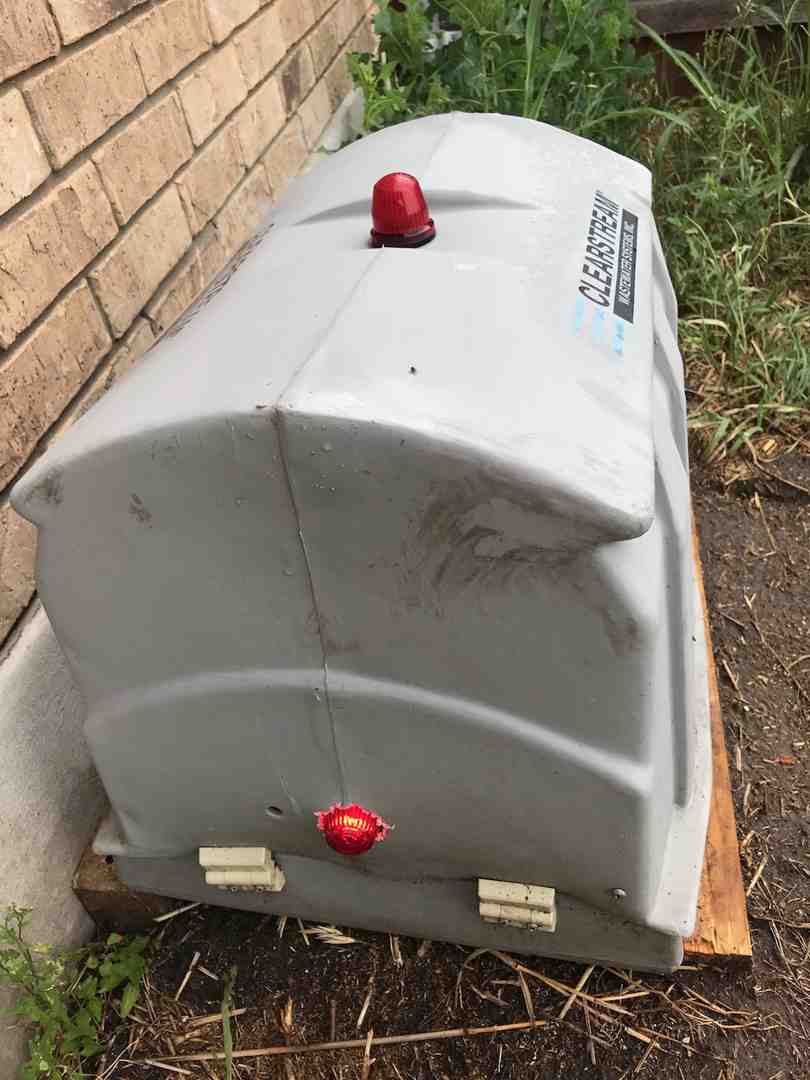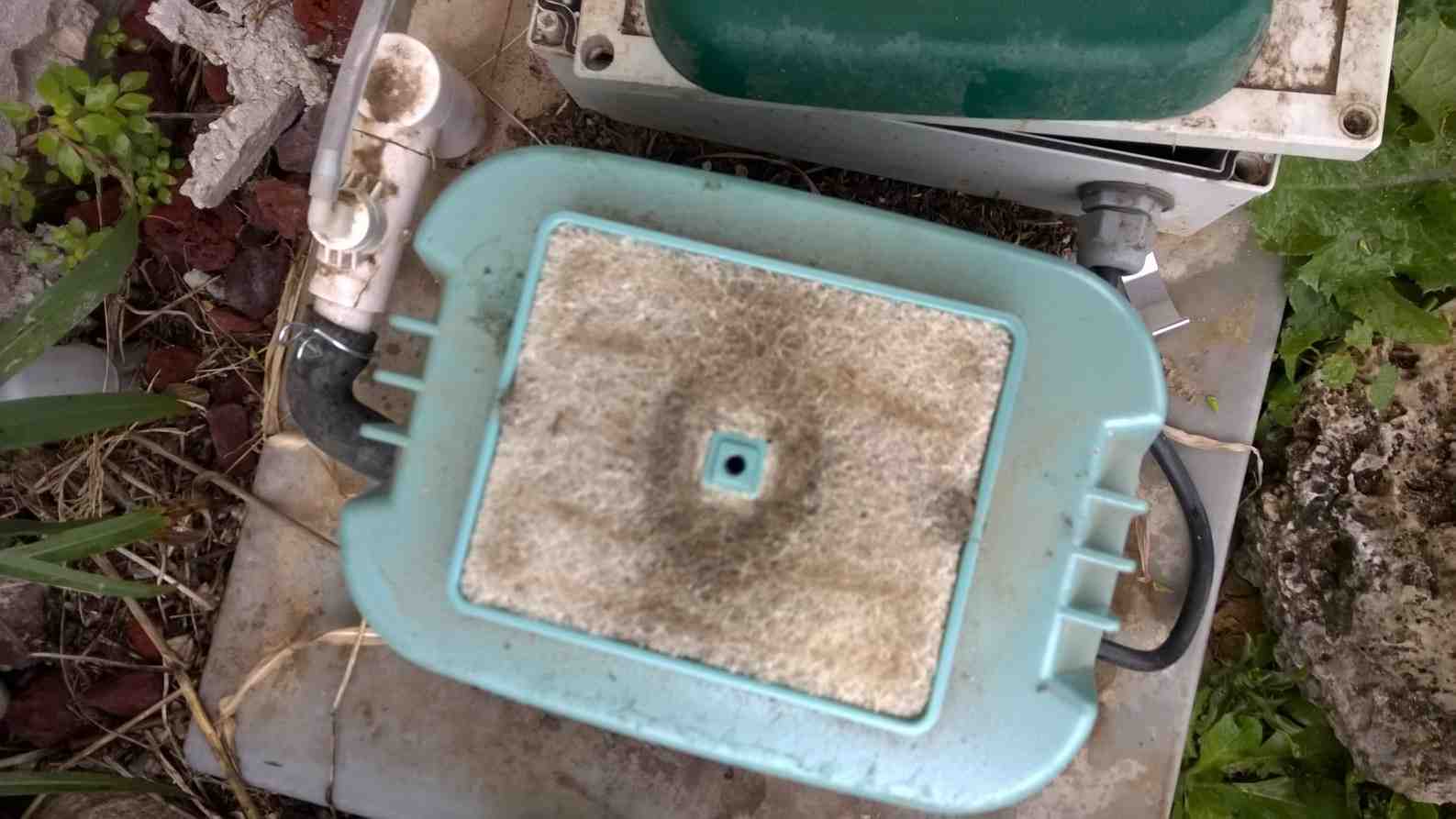What That Blaring Noise Means for Your Home
Septic system alarm troubleshooting starts with understanding that your alarm is designed to protect your home from sewage backups and costly damage. When that loud buzzer sounds, it's not a cause for panic - it's your system's way of giving you a 24-48 hour warning before potential problems become disasters.
Quick troubleshooting steps when your septic alarm sounds:
- Stay calm - it's usually not an immediate emergency
- Silence the alarm using the button on the alarm box
- Do NOT turn off power to the system
- Reduce water usage immediately (no laundry, dishwasher, long showers)
- Check the alarm light - red means high water, green means power
- Call a professional if the red light stays on after 10+ hours
Most septic alarms are triggered by higher-than-normal water levels in your tank. This happens when wastewater can't reach your drain field properly due to pump problems, clogged filters, or saturated soil from heavy rain.
The good news? Septic alarms help owners take quick action to prevent septic tank overflows and backups, which pose health and environmental risks and can result in expensive repairs. Your alarm system gives you time to address issues before they become messy, expensive emergencies.
Whether you have a conventional gravity system or an aerobic treatment unit, understanding what triggers your specific alarm type helps you respond appropriately and know when professional help is needed.
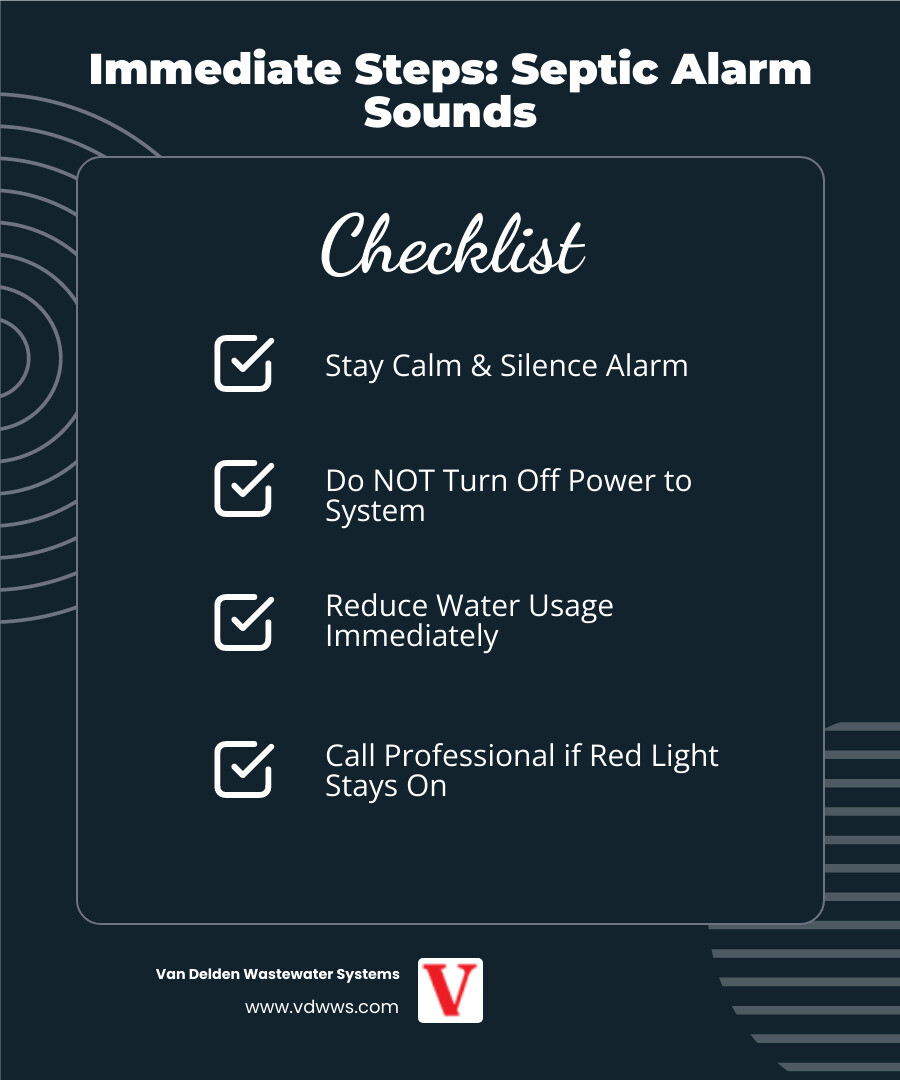
First Steps: What to Do Immediately When Your Septic Alarm Sounds
That sudden, piercing alarm sound can be startling, but septic system alarm troubleshooting starts with remembering that you're not facing an immediate disaster. Your septic alarm is your friend, giving you a 24-48 hour warning before things could get messy.
The first thing to do is silence that alarm. Look for the alarm panel (usually mounted on an exterior wall or near your septic system) and press the silence button or mute switch. This stops the noise, but it doesn't fix the problem. The red light should stay on to remind you that your system still needs help.
Here's what you absolutely should NOT do: don't turn off the power to your septic system. Cutting power can make things worse, as your system needs electricity to do its job, especially if you have pumps working to move wastewater along.
Understanding whether you're dealing with a high-level alarm or an aerator alarm helps too. High-level alarms mean water isn't draining properly, while aerator alarms typically signal issues with the air pump in aerobic systems. For more detailed guidance on what to do when your alarm activates, check out What Do I Do If My Alarm Is On.
Check the Alarm Panel and Breaker
Once you've silenced the noise, inspect your alarm panel. You'll typically see two lights: a green light means your system has power, while a red light indicates a problem. If that red light stays on even after you've pressed the silence button, the underlying issue is still there.
Sometimes the fix is surprisingly simple. Check your home's circuit breaker panel to make sure the septic system breaker hasn't tripped. Power outages, storms, or even an accidental disconnection of an outdoor outlet can trigger false alarms. If you find a tripped breaker, try resetting it—but if it trips again immediately, that's a sign you need professional help.
Conserve Water Immediately
When that alarm sounds, your system is overloaded. Every gallon you can avoid using gives your system a fighting chance to catch up. Temporarily change your household routine. No laundry loads, no dishwasher cycles, and definitely no long showers. Keep toilet flushing to a minimum and avoid flushing solids that could make things worse.
A day or two of inconvenience beats dealing with sewage backup in your home or yard. Your septic system capacity is limited, and when the alarm sounds, you're already pushing those limits. By cutting back on water use, you're helping prevent overflow while you figure out what's wrong.
Most systems can handle normal daily water use without triggering alarms, so when yours goes off, something's definitely not right. Your water conservation efforts buy you precious time to get professional help before a minor issue becomes a major headache.
Your Step-by-Step Guide to Septic System Alarm Troubleshooting
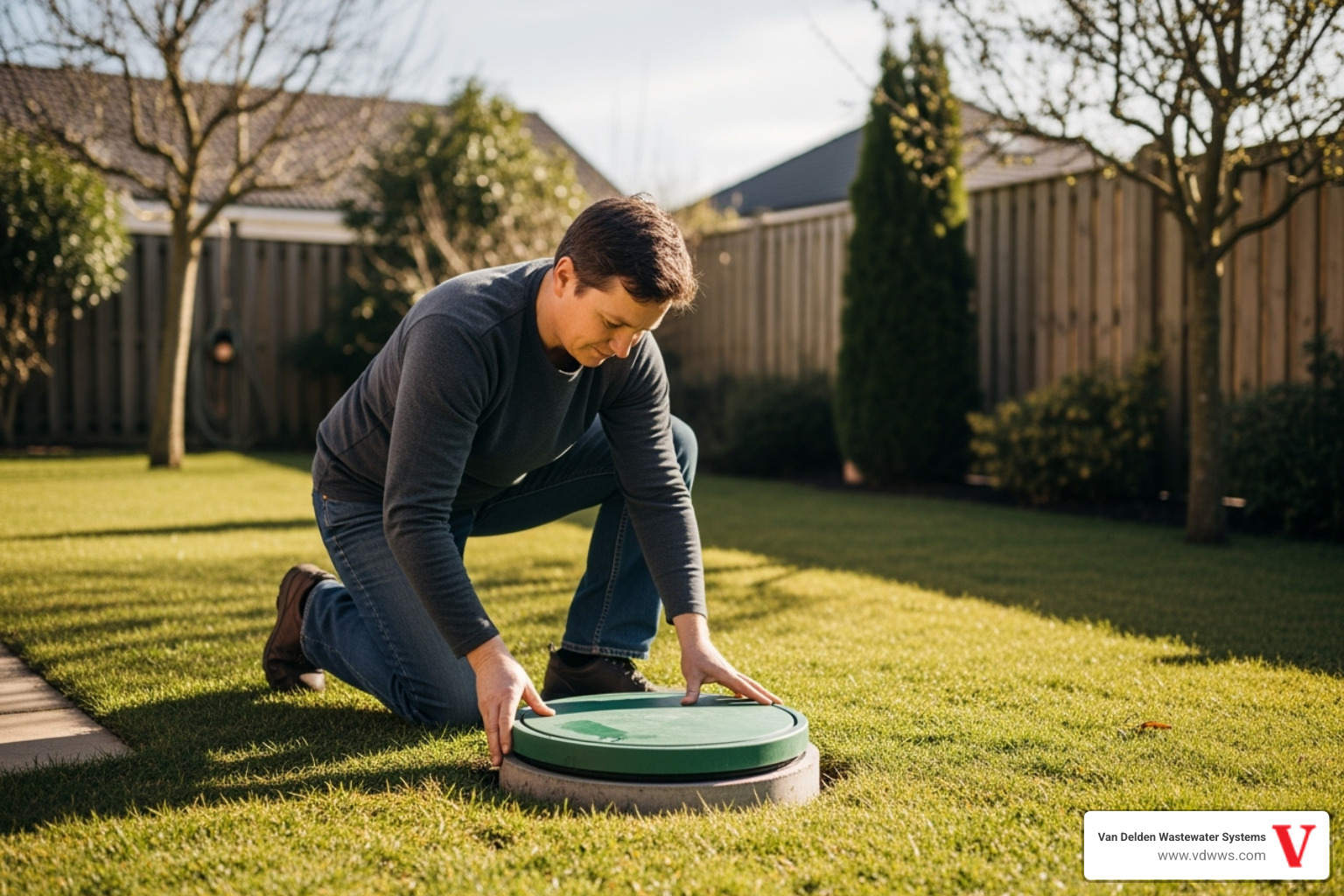
Now that you've silenced the alarm and cut back on water, it's time to investigate. A septic alarm is like your car's check engine light; it signals a problem but doesn't specify the cause. Fortunately, septic system alarm troubleshooting often reveals common, fixable issues. Most alarms indicate high water levels, and the system is designed to prevent costly sewage backups that pose property and health risks.
The usual suspects include pump issues, float malfunctions, electrical problems, and clogged filters. Occasionally, heavy rain saturates your drain field, causing the alarm. Understanding these triggers helps you communicate with professionals and sometimes find simple fixes. For comprehensive diagnostic information, check out this helpful resource on how to Diagnose & Fix What's Wrong at Your Building.
DIY Septic System Alarm Troubleshooting for Common Issues
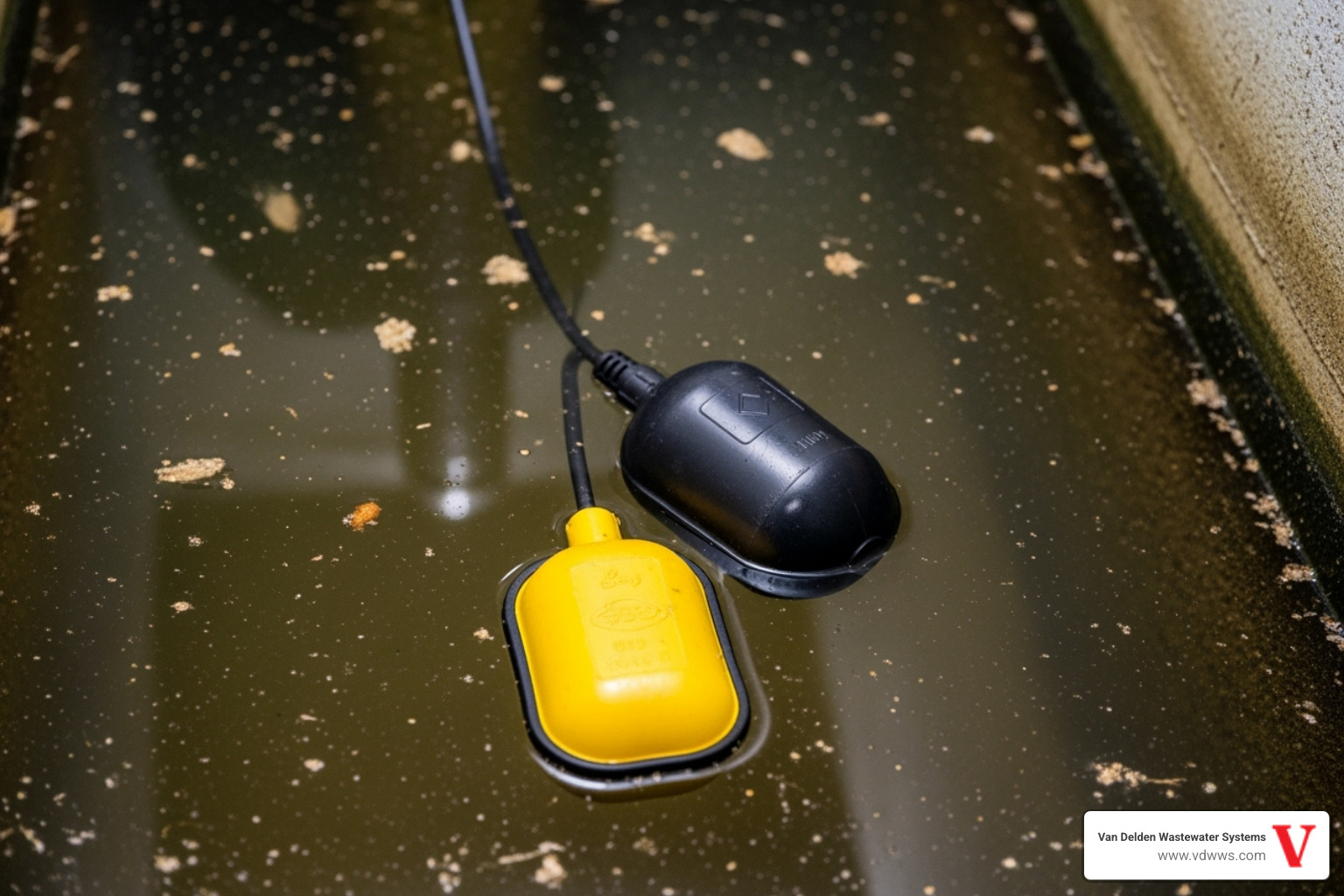
While many septic issues require professional attention, there are several things you can safely check yourself as part of your septic system alarm troubleshooting process.
Effluent pump failure tops the list of common culprits. If your system uses a pump to move wastewater to the drain field (common in both aerobic systems and conventional pump systems), pump problems can trigger your alarm. The pump might have stopped working entirely, or it could simply be a power issue preventing it from running.
Stuck float switches cause their fair share of headaches too. This little device tells your pump when to turn on and off based on water levels. When debris gets tangled around the float or it malfunctions, it can get stuck in the "up" position. This tricks the system into thinking water levels are always high, keeping that alarm buzzing even when everything else is fine.
Power flickers and tripped breakers might sound too simple to cause problems, but they're surprisingly common triggers. A brief power outage or a tripped circuit breaker can confuse your system's electronics. Always double-check your home's electrical panel to make sure the septic system's breaker is in the "on" position.
Clogged effluent filters often catch homeowners off guard. Many septic tanks have these filters to prevent solids from reaching the drain field. When they get clogged, water can't flow out of the tank properly, causing levels to rise. Here's a common misconception: many people think a high-level alarm means their tank needs pumping. While pumping might temporarily lower the water level, it won't fix an underlying clog.
Weather-Related Triggers: Heavy Rain and Saturated Drain Fields
Sometimes your septic alarm has nothing to do with mechanical failure and everything to do with the weather. If you've had heavy rainfall recently, especially over several days, Mother Nature might be the culprit behind your alarm.
Groundwater infiltration happens when rainwater seeps into your septic system through the soil. This extra water raises the overall level in your tank, even though you haven't used more water than usual. It's like trying to pour more coffee into an already full cup.
Saturated soil in your drain field creates a domino effect. When the soil becomes waterlogged from rain, it loses its ability to absorb wastewater from your septic tank. Think of it like a sponge that's already soaked - it simply can't take any more water.
Poor drainage around your property makes weather-related alarms more likely. If your drain field area tends to collect standing water or your property naturally drains slowly, heavy rains will overwhelm the system more easily.
Hydrostatic pressure from all that saturated soil actually prevents wastewater from flowing out of your tank properly. The water pressure in the ground pushes back against your system's normal flow.
When rain saturates your drain field too quickly, it can even cause groundwater to leak into your tank, raising levels enough to trigger the alarm. This is frustrating but fairly common during particularly wet periods. During these times, strict water conservation becomes even more critical to help your system recover.
For specific guidance on managing your aerobic system during heavy rainfall, our detailed guide on Heavy Rain What To Do When Your Aerobic System Alarm Activates provides practical steps to protect your system.
Conventional vs. Aerobic Systems: Understanding Different Alarm Triggers
One of the most important aspects of septic system alarm troubleshooting is understanding the type of system we have. Think of it like knowing whether you drive a manual or automatic transmission car - the basics are similar, but how they work (and what can go wrong) differs significantly.
Conventional septic systems and aerobic treatment units (ATUs) each have their own personality quirks when it comes to alarm triggers. Knowing which type you have helps you respond appropriately and communicate effectively with your service technician.
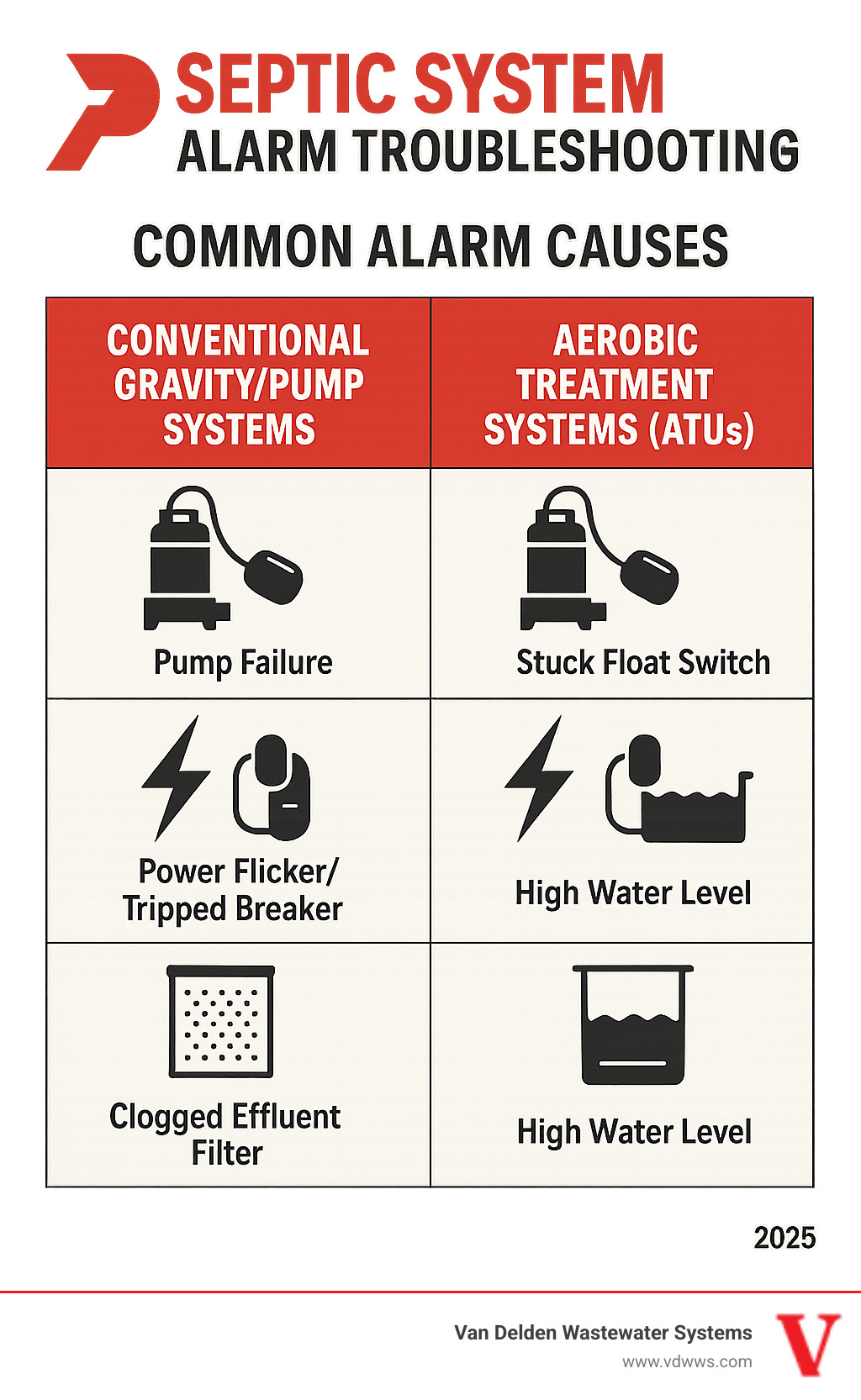
Alarms on Conventional Septic Systems
Conventional septic systems are the "old reliable" of wastewater treatment. They typically rely on gravity to move wastewater through the system and don't have fancy aeration devices humming away. When your conventional system's alarm sounds, it's usually telling you about a high water level caused by a backup somewhere in the flow.
The most common troublemaker is an effluent filter clog. This filter sits at the outlet of your septic tank, acting like a bouncer that keeps solids from crashing the drain field party. Over time, it gets clogged with sludge and debris, causing water to back up into the tank like a slow drain in your kitchen sink.
If your conventional system uses a submersible pump failure (some need pumps when the drain field is uphill or far away), pump problems become the likely suspect. The pump itself might have given up the ghost, or its float switch could be stuck or malfunctioning. Either way, water accumulates in the pump tank instead of moving along to where it belongs.
Outlet line blockages are another frequent cause. Tree roots love to find their way into septic pipes, and sludge buildup or pipe damage can create bottlenecks. When wastewater can't exit the tank, it has nowhere to go but up - triggering your alarm.
Sometimes the problem lies with leach field failure itself. After years of faithful service, drain fields can become compacted, develop biomat buildup, or simply reach the end of their useful life. When the septic alarm sounds, it tells us that there is a problem getting wastewater to the drain field.
Alarms on Aerobic Treatment Systems (ATUs)
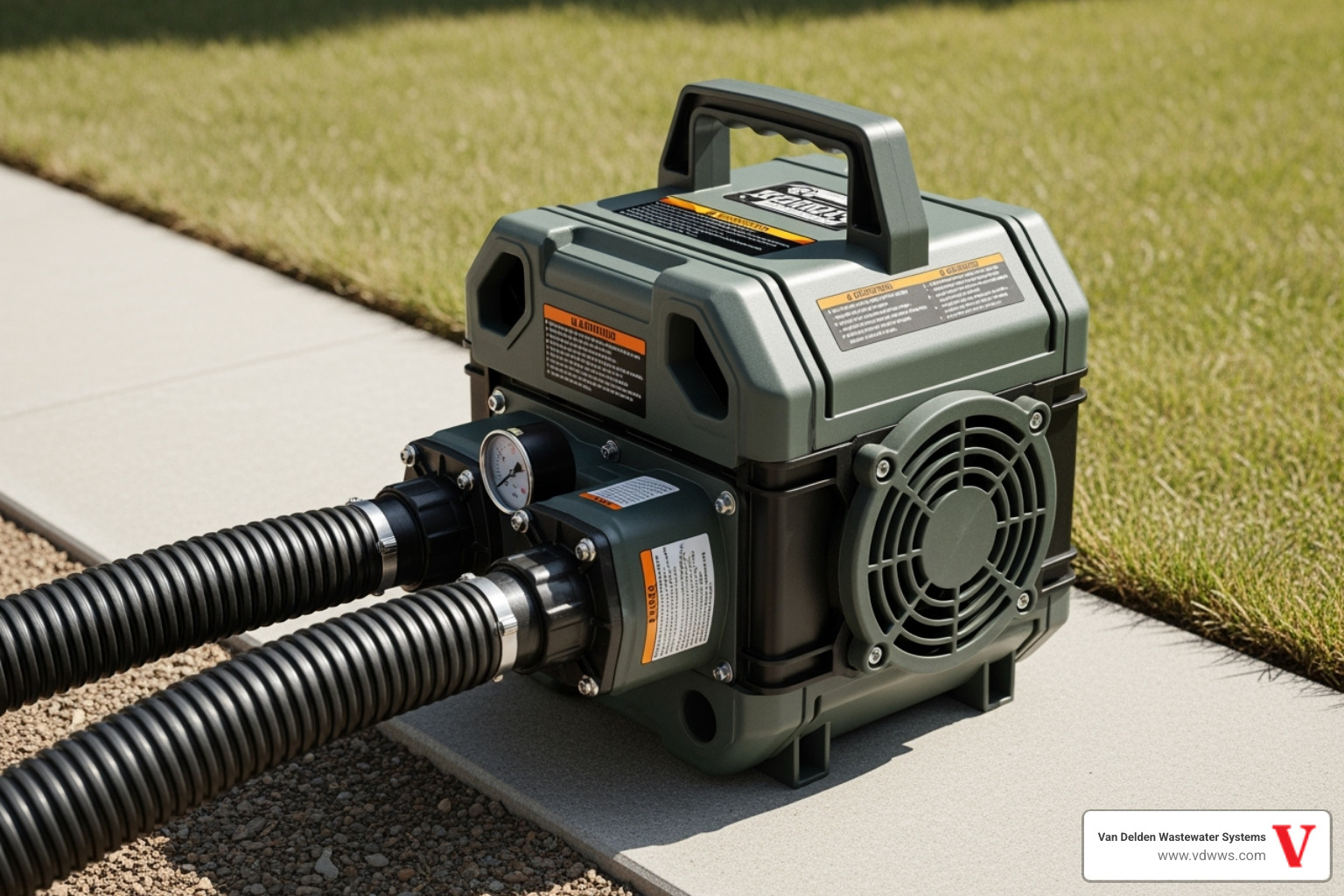
Aerobic Treatment Systems are the high-tech cousins of conventional systems. They use an aeration device - like an external air pump, compressor, or internal aerator - to pump oxygen into the wastewater. This creates a thriving community of beneficial bacteria that break down waste more effectively than conventional systems.
All septic tanks with pumps, typically aerobic systems, require alarms. The cause of an alarm on aerobic systems usually falls into one of two categories.
The most common culprit is aerator malfunction or air pump failure. When the aeration device stops working or isn't putting out enough air, the system can't treat wastewater properly. This triggers what's often called a "low pressure" or "aerator failure" alarm. You can usually tell if your aerator is working by listening for its gentle humming sound or feeling for air coming from the main hose.
High water level alarms can also occur in aerobic systems, just like their conventional counterparts. If your aerator seems to be running normally but the alarm persists, high water is likely the issue. This happens when the submersible pump fails or its float switch gets stuck, preventing treated water from being dispersed. Clogged outlet lines (like a blocked chlorine feeder in gravity-discharging systems) or clogged sprinklers in the spray field can also cause water to back up and trigger the alarm.
Understanding these distinctions makes septic system alarm troubleshooting much more manageable. For more details on what to do when your aerobic system alarm activates, visit Aerobic System Alarm Activation. And if you're having issues with your sprinklers, our guide on Troubleshoot Aerobic System Sprinklers can help you get things flowing smoothly again.
Proactive Care: How to Prevent Future Septic Alarms
The best septic system alarm troubleshooting is the kind you never have to do! Think of your septic system like your car – regular maintenance keeps you from being stranded on the side of the road. A little prevention goes a long way toward keeping that alarm silent and your system running smoothly.
Regular maintenance is absolutely the cornerstone of preventing septic alarms. Having a septic professional inspect your system annually allows us to catch small issues before they become big, expensive problems. It's much easier (and cheaper) to replace a worn float switch during routine maintenance than to deal with a sewage backup emergency at 2 AM.
Your pumping schedule matters more than you might think. Most septic tanks need pumping every 3-5 years, depending on household size and water usage. However, don't wait until your tank is completely full – that's when problems start. Regular pumping prevents excessive sludge buildup that can clog filters and cause those dreaded high water levels.
Water conservation isn't just good for the environment – it's essential for your septic system's health. Spread out water-intensive activities like laundry and dishwashing throughout the week instead of doing everything on Saturday. Your system can handle normal daily water use just fine, but sudden surges can overwhelm it.
Here's where many homeowners get into trouble: proper waste disposal. Your septic system is designed to handle human waste and toilet paper – that's it. Those "flushable" wipes? They're not really flushable. Feminine hygiene products, paper towels, cat litter, and excessive food scraps all spell trouble for your system. When in doubt, throw it out (in the trash, not down the drain).
Don't forget about the little things that add up over time. Checking for leaks around your home might seem unrelated to septic alarms, but even small drips from toilets or faucets add unnecessary water to your system day after day. Fix those annoying leaks – your septic system will thank you.
It's also worth periodically checking the pipes connecting your septic tank to other parts of the system. Look for signs of corrosion or wear that could lead to future blockages. A quick visual inspection during your annual maintenance can prevent bigger headaches down the road.
Here's something many people don't realize: regularly checking that your septic tank alarm is working properly is crucial. If your alarm system fails, you won't get that vital early warning when something goes wrong. Test your alarm periodically to make sure it's ready to protect your home when needed.
Advanced Septic System Alarm Troubleshooting: When to Call the Pros
While basic septic system alarm troubleshooting can help you understand what's happening, some situations absolutely require professional expertise. Ignoring a septic alarm or trying to fix complex issues yourself can turn a manageable problem into a disaster that affects your home and the surrounding environment.
You should call a professional septic service immediately if the red alarm light persists for more than 10 hours after you've silenced it, checked the breaker, and drastically reduced water usage. This persistent red light is your system's way of saying the problem isn't going away on its own.
Sewage odors inside your home or around your septic system are never normal and always require professional attention. These smells indicate system failure that could pose serious health risks. If you're dealing with aerobic system odors specifically, our guide on Why Does My Aerobic System Smell can provide additional insight into what might be happening.
Listen to your plumbing – gurgling sounds or slow drains throughout your house are classic warning signs of backups or blockages that need professional diagnosis. Similarly, if you notice standing water or puddles in your yard near the septic tank or drain field, this suggests your system is oversaturated or failing, causing wastewater to surface where it shouldn't.
Electrical issues beyond a simple tripped breaker, pump failures, or suspected float malfunctions require specialized knowledge and tools to diagnose and repair safely. Don't risk making the problem worse by attempting complex repairs yourself.
If sewage backs up into your home, this is a true emergency requiring immediate professional attention. Sewage cleanup involves dangerous biohazards that must be handled properly to ensure your family's safety.
Septic system troubleshooting should always be done by a professional if you can't quickly determine the cause. If you're not familiar with your system's workings or don't feel comfortable checking things yourself, there's no shame in calling your local service provider. At Van Delden, our background-checked, non-commissioned technicians provide honest, expert service – we're here to help, not oversell you on unnecessary repairs.
Frequently Asked Questions about Septic Alarms
When your septic alarm goes off, it's completely normal to have questions racing through your mind. After helping thousands of homeowners with septic system alarm troubleshooting over the decades, we've heard just about every concern you can imagine. Let's tackle the most common ones together.
How do I reset my septic alarm?
This is probably the first thing most folks want to know when that buzzer starts blaring! To reset your septic alarm, simply press the silence or test button on the alarm box. You'll hear blessed quiet as the audible buzzer stops.
But here's the important part - and we can't stress this enough - resetting the alarm doesn't actually fix whatever's wrong. Think of it like hitting the snooze button on your morning alarm. The noise stops, but you still need to get up eventually!
If that red light stays on after you've reduced your water usage for several hours, it means the underlying problem is still there. The system is still telling you something needs attention. After 10 hours of water conservation, if you're still seeing that red light, it's time to call in the professionals. The alarm is doing its job - giving you that crucial 24-48 hour warning window.
Can heavy rain really cause my septic alarm to go off?
Oh, absolutely! This surprises a lot of people, but Mother Nature can definitely trigger your septic alarm. We see this all the time, especially during our Texas storm seasons.
Here's what happens: when we get intense or prolonged rainfall, your drain field can become completely saturated. Think of it like a sponge that's already full - it simply can't absorb any more water. This prevents your drain field from accepting the wastewater from your septic tank, causing the water level in your pump tank to rise and trigger that high-water alarm.
Sometimes the rain can even leak into the tank itself, raising the water level to the point where the alarm activates. It's frustrating because you haven't done anything wrong, but your system is essentially saying, "I'm drowning out here!"
During these soggy periods, it's absolutely crucial to minimize your water use. Skip the laundry, keep showers short, and give your system a fighting chance to catch up once the ground starts drying out.
Is a septic alarm an emergency?
This is the big question that keeps people up at night! The honest answer is that it's usually not an immediate emergency, but it is definitely urgent.
When your alarm goes off, your system is essentially saying, "Hey, I've got about 24-48 hours of reserve capacity left before we might have a real problem." It's like your car's gas light - you don't have to pull over immediately, but you definitely shouldn't ignore it and keep driving for days.
The alarm means something is wrong and your system needs attention. But you don't need to panic or call an emergency service at 2 AM (unless you're seeing sewage backing up into your home - that's a different story entirely!).
Your best approach is to stay calm, silence that noisy buzzer, drastically cut your water usage, and call a professional promptly. This gives you the best chance of fixing the problem before it becomes a messy, expensive sewage backup. Trust us - a little proactive septic system alarm troubleshooting now can save you from a much bigger headache later!
Your Partner in Septic System Health
When your septic alarm sounds, it's your system's way of asking for help – and ignoring that call can lead to some pretty messy consequences. We're talking about costly repairs, property damage, and serious health hazards that no homeowner wants to deal with. Think sewage backing up into your home, contaminated groundwater, or a failed drain field that needs complete replacement. These aren't just inconveniences; they're expensive emergencies that can cost thousands of dollars and disrupt your family's daily life.
Understanding what triggers your alarm through proper septic system alarm troubleshooting is definitely the first step, and we hope this guide has given you the confidence to handle those initial moments when the buzzer goes off. But here's the thing – while knowing how to silence the alarm and reduce your water usage buys you valuable time, it doesn't actually fix the underlying problem that caused the alarm in the first place.
That's where professional service makes all the difference. A trained technician can diagnose the exact cause of your alarm, whether it's a failed pump, clogged effluent filter, saturated drain field, or malfunctioning aerator. More importantly, they can provide a lasting solution that prevents the same issue from happening again next month.
For homeowners in the Helotes area, Van Delden Wastewater Systems has been protecting families and their investments since 1937. Our experienced, non-commissioned technicians are background-checked professionals who take the time to educate you about what's happening with your system. We believe you deserve to understand what went wrong and how we're fixing it, which is why we provide detailed service forms and photo documentation of our work.
When you're dealing with a septic emergency, you want honest, quality service from people who care about your home as much as you do. Our family-owned business has built its reputation on doing exactly that – no high-pressure sales tactics, just straightforward solutions that get your system back to working properly.
Schedule professional service for your aerobic system today.
Customer Reviews
Peter was personable, professional and thorough. Highly recommend Van Delden. You might be able to find a cheaper company but not better!
On time. 100% professional, knowledgeable, and courteous. Very helpful and straightforward. That is the bar all businesses should strive for.
It has been a pleasure working with your company. Not only did y’all communicate very well but your workers were always polite! Thank you!
“I thank Van Delden for such prompt service. Honest people are hard to come by these days. I will certainly recommend Van Delden to anyone! Jesse is an upstanding young man and very nice to talk to. I thank everyone at Van Delden for taking such good care of me.”
This is just a note to thank you for explaining the problem with my system. You didn’t have to be so kind and I appreciate your good business ethics and time spent. In the future you will have mine in return!




